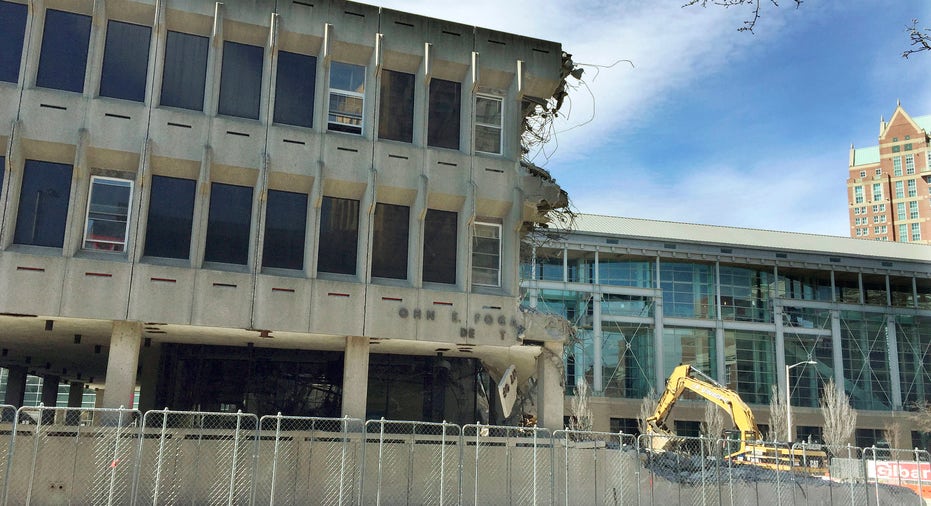Banished Brutalism: Death knells abound for building style

PROVIDENCE, R.I. – When an exposed concrete subway vault near the U.S. Capitol was painted white this spring, riders rejoiced at the brightened Washington Metro station. But some preservationists were unhappy, complaining that a "cardinal rule" of the Brutalist style was broken.
Brutalism, which got its name from a French word for raw concrete, has been sparking public battles ever since the architectural style flourished in the 1960s and 1970s, spawning buildings from Boston to Belgrade.
Now, the era's aging structures are being declared eyesores and slated for demolition in cities around the world. Or, as in Washington's Union Station, their austere features have been softened.
___
DEATH TOLL
The public's eagerness to get rid of Brutalist buildings has made their life expectancy short, compared with some older architectural styles. Structures headed for imminent demolition include an office building in York, England. A church in Atlanta was razed this spring, and the McKeldin Fountain near Baltimore's Inner Harbor disappeared this year. Structural problems can also hasten their death. Earthquake concerns in the San Francisco Bay Area doomed architect Mario Ciampi's landmark Berkeley Art Museum, which remains vacant and has been replaced with a new museum nearby.
___
KAZOO FUNERAL
For all the Brutalist buildings that go down without a fight, a few get a loving farewell. In downtown Providence, kazoo-playing mourners recently held a funeral procession and gave eulogies as demolition crews prepared to tear down the John E. Fogarty Building, built as a government welfare office in the 1960s.
"It's not an easy style to like," said Marisa Angell Brown, an architectural historian at nearby Brown University who attended the funeral and co-wrote a mock obituary for the 49-year-old building. "We tend to prefer boring to ugly."
Final work to raze the building began Friday.
She said the "preservation community here didn't put up a huge fight to save it," but she will miss the building, especially if it's replaced by a bland hotel. The owner of an Irish pub across the street disagrees.
Murphy's bar proprietor Ruth Ferrazzano said its grim look would be more fitting in Soviet Russia.
___
ELEGANT AND SEXY
Not everyone thinks the Brutalist style is ugly. In Sydney, Australia, tenants of a public housing high-rise overlooking the harbor and the city's opera house have been fighting to protect the terraced building by getting it listed on a historical registry. A chain-link fence was erected this week as both sides await a court ruling that could decide what happens next.
"True Brutalism is at once elegant and sexy," wrote a columnist defending the building in The Sydney Morning Herald last year. "It's a style that esteems strength and raw honesty, but especially as juxtaposed against the delicacy of glass, the sway and spike of nature, the play of light."
___
PROGRESSIVE IDEALS
It's not an accident that Brutalist buildings are often public, from DC's forbidding FBI headquarters, which is likely fated for demolition, to housing complexes in Europe and college campuses, city halls and county administration offices throughout the United States.
"A lot of them were sort of left-leaning, very progressive and interested in creating a new style that was in opposition to the high modernism that you saw on Park Avenue," Angell Brown said. "There was a feeling among these architects that government was a positive force in people's eyes. These were democratic institutions that would kind of lead the way in progressive ideals."
___
IKEA'S BRUTALIST BILLBOARD
There's hope for some Brutalist buildings, including a vacant office tower designed by famous architect Marcel Breuer that looms over Interstate 95 in New Haven, Connecticut.
The millions of motorists who have driven past the former tire company headquarters over the past decade know it mostly as a canvas for furniture giant Ikea, which ties a huge banner ad from its roof to advertise chairs or desks sold at its adjacent store. But now Ikea, which owns the property, is allowing artists to use the building as a pop-up exhibit this summer and is entertaining proposals from developers who want to creatively refurbish the building.
"It can redefine the imagination of the city and maybe the whole New York region," said Matthew Nemerson, New Haven's economic development administrator. He added that it was built with "good-quality concrete."



















